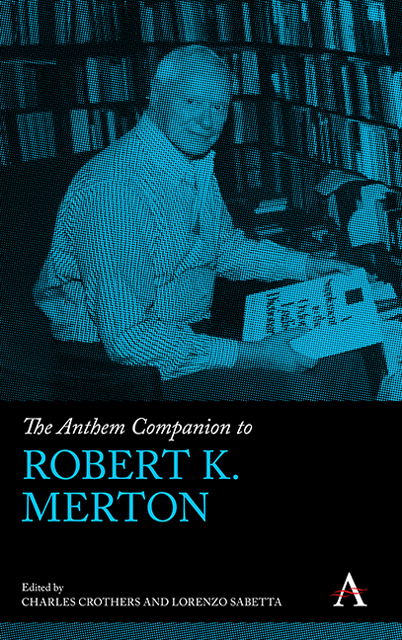Book contents
- Frontmatter
- Dedication
- Contents
- List of Figures and Tables
- Chapter One Introduction: Merton’s Self-Exemplifying Classical Sociological Contributions
- Chapter Two Skeptical Faith, Left Politics, and the Making of Young Robert K. Merton
- Chapter Three Theorist’s Progress: Young Robert K. Merton, 1941–1949
- Chapter Four Taking a Seminar with Merton
- Chapter Five The Development of Mertonian Status-and-Role Theory
- Chapter Six Theory as an Option or Theory as a Must? The Bearing of Methodological Choices on the Role of Sociological Theory
- Chapter Seven “Interviews of a Special Type”: Robert K. Merton and Codification of the Focused Interview
- Chapter Eight Science as a Culture
- Chapter Nine “Providing Puzzles”: Science as Norms and Values
- Chapter Ten A Mertonian Breviary for Cultural Sociologists
- Chapter Eleven The Unpublished Robert K Merton
- Author Biographies
- Index
Chapter Nine - “Providing Puzzles”: Science as Norms and Values
Published online by Cambridge University Press: 10 January 2023
- Frontmatter
- Dedication
- Contents
- List of Figures and Tables
- Chapter One Introduction: Merton’s Self-Exemplifying Classical Sociological Contributions
- Chapter Two Skeptical Faith, Left Politics, and the Making of Young Robert K. Merton
- Chapter Three Theorist’s Progress: Young Robert K. Merton, 1941–1949
- Chapter Four Taking a Seminar with Merton
- Chapter Five The Development of Mertonian Status-and-Role Theory
- Chapter Six Theory as an Option or Theory as a Must? The Bearing of Methodological Choices on the Role of Sociological Theory
- Chapter Seven “Interviews of a Special Type”: Robert K. Merton and Codification of the Focused Interview
- Chapter Eight Science as a Culture
- Chapter Nine “Providing Puzzles”: Science as Norms and Values
- Chapter Ten A Mertonian Breviary for Cultural Sociologists
- Chapter Eleven The Unpublished Robert K Merton
- Author Biographies
- Index
Summary
Robert King Merton has played an important role in shaping the field of sociology of science and technology. He defined the main orientations of a collective research program with his 1935 dissertation on Science, Technology and Society in 17th Century England, but even more so through his long-lasting interest in the sociological study of the practices, norms, and values of the scientific community. He succeeded where most of his mentors (Pitirim Sorokin, George Sarton) had previously failed by developing a “disciplinary program” and gathering promising students who tested and pursued some of his intuitions in multiple directions (Dubois 2014). His Columbia University seminar with Harriet Zuckerman on the sociology of science, from 1965 to 1985, played a critical role in this matter. Key contributors to the field of science study have been initially trained in this seminar. And still today the volume edited by Norman Storer for Chicago University Press in 1973—Sociolog y of Science. Theoretical and Empirical Investigations (Merton 1973)—remains an important intellectual landmark.
As we have now reached the fourth (or even the fifth) generation of professional sociologists of science, how should we consider Merton's scientific contribution? Should it be seen as a “patrimonial” component of the field? Merton would have said “Obliteration by incorporation.” I argue here that some of his insights and findings not only still benefit from unexpected visibility but also deserve a more systematic form of critical reappropriation. As one of his former research assistants, Stephen Cole (2004, 843), put it in a quasi-autobiographical essay, “with all its faults, [Merton] had the ability to arouse interest in others—interest that frequently led others to do empirical research. This is, after all, one of the major functions of theoretical work—providing puzzles.”
In this chapter, I examine some of these “Mertonian puzzles” for the study of contemporary science and technology. In the first section, I return briefly to Merton's writings to characterize the main features of his normative approach of science. In the second section, I underline some aspects of the contemporary diffusion of Merton's ideas. Finally, in the third section, I discuss how this program provides some tools to investigate empirically some of the most recent and intriguing forms of evolution in the scientific community.
- Type
- Chapter
- Information
- The Anthem Companion to Robert K. Merton , pp. 165 - 182Publisher: Anthem PressPrint publication year: 2022

